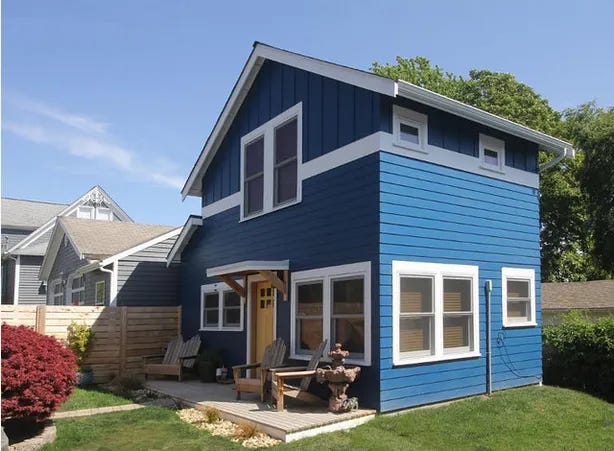As the new Council season launches this coming week, I wanted to take a moment to share what I am excited about:
*Re-legalizing missing middle housing – On Jan 25, Council will open the public hearing on the Housing Types and Housing Choices for a Complete Community LUMO text amendment. This amendment will implement a key strategy that the Council has been exploring over the last several years to make sure families of all income levels in Chapel Hill have the opportunity to live in our community and be close to jobs, schools, and parks.
Allowing a range of housing types means that we’ll have more modest, affordable choices -- whether for a homeowner who wants to make sure their parents can age in place in an adjoining duplex, or for a young family hoping to live closer to work. Right now, many of our neighborhoods only allow the biggest and most expensive housing. When we allow a wider range of choices -- duplexes, triplexes, collections of small cottages -- we create affordable choices of all shapes and sizes for families of all income levels and make sure seniors, young couples, and working people can live in Chapel Hill.


Homes of all shapes and sizes were once plentiful until our zoning regulations made them illegal. By re-legalizing a range of housing options, we are reversing the rules that have created longer commutes and pushed people further and further away from their jobs. Today, a starter home here is out of reach for many. Allowing homes of all shapes and sizes means we can help keep Chapel Hill affordable for seniors, young couples, and working families.
It is also important to note that, through this change, we will be addressing not only affordability but also equity concerns. We need to take this important step to abandon the exclusionary zoning that originated during Jim Crow and continues to segregate our neighborhoods today. This segregation is a byproduct of explicit government policies at the local, state, and federal levels that we have a responsibility to rectify (The Color of Law by Richard Rothstein is an excellent resource on this history).
*Increasing coordination, collaboration, and support for sheltered and unsheltered community members experiencing homelessness – I am deeply grateful for IFC, other front-line organizations, community volunteers, and the Town and County staff who work together to to support our most vulnerable residents 24-hours a day, 365 days a year. The extreme cold temperatures we experienced in late December created a health and safety crisis for unsheltered community members. It was heartening to see how our partners came together to address the challenge and yet it also showed there are gaps in our continuum of care that we need to act quickly to fill. I am eager to take this up in the coming months to ensure we are doing everything in our power, and collaborating as effectively as possible, to provide evidence-based, compassionate, and holistic supports. (Another post on this topic will be forthcoming soon)
*Implementing the Complete Communities Framework – As I shared in my last post, the Council has a vision of making Chapel Hill a complete community where people from diverse backgrounds, experiences, and income levels can thrive – that means access to housing, parks, transit, jobs – and we are working on making all of those a reality for everyone. The Council approved moving forward with several Complete Community pilot projects in December focused on securing funding for our planned “everywhere-to-everywhere greenways” and applying the framework to upcoming development projects to ensure quality placemaking, affordability, multi-modal transit, and climate considerations are all incorporated. I am excited to see these pilot efforts move forward, as well as applying the framework to all new development applications.
*Land Use Management Ordinance (LUMO) re-write – While not a terribly exciting topic on the surface (the LUMO is highly technical and almost like another language) but it is the key to codifying so much of what the Council has been working to do over the last several years as part of our Shaping Our Future initiative.
The LUMO should be a tool that helps us meet our shared goals – unfortunately, the current LUMO works against our values and strategies. It is exceedingly difficult to understand (even for planning professionals), contradictory, and it requires a planning approval process that is lengthy and unpredictable, and therefore expensive. This excludes local developers and contributes to higher housing costs.
My hope is that our new LUMO will have a streamlined permitting process and expand incentives for developers to include affordable housing, incorporate bike and pedestrian facilities, improve climate responsiveness and provide parks and green space. We also need to modernize our code to build on our efforts in the Housing Types and Housing Choices for a Complete Community to improve opportunities to live in Chapel Hill and encourage the development of new business and office space.
As always you can email me your thoughts at kstegman@townofchapelhill.org and/or participate in a Council Meeting. I look forward to hearing from you.




Thank you Karen!